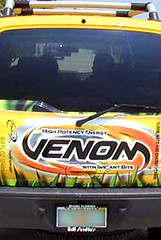Almost anyone can sympathize with the notion that even the most polished presenters can experience stage fright at the worst possible time. Without question, that seems to be what happened to Miss South Carolina during Miss Teen USA.
When asked why she thinks “one-fifth of Americans cannot find the United States on a map, “ Miss South Carolina offered up one of the most perplexing answers and solutions in the history of all pageants.
“I personally believe that U.S. Americans are unable to do so because some people out there in our nation don’t have maps.” — Lauren Caitlin Upton
Upton then went on to offer a solution that included, um, better education in third world countries. Despite the flub, she still finished third, which further demonstrates just how important the question and answer segment was to the pageant.
To redeem herself, Upton agreed to appear as a guest on NBC’s “Today” show where she was given a do-over. “I believe that there should be more emphasis on geography in our education so people will learn how to read maps better. Yay!”
Hmmm… I don’t know if that is any better given the do-over drove 1.5 million more people to see the original flub on YouTube (4.5 million and counting). Maybe someone should have advised Upton to say something completely different.
“The question took me aback because I personally don’t believe that one-fifth of Americans cannot find the United States on a map. I’d like to see the methodology of that study because I doubt its objectivity.” Or maybe …
“What kind of propaganda is Miss Teen USA trying to spread about our country anyway? That’s what I’d like to know.” Or maybe …
“Hey, what difference does it make? I was the third runner-up. Yay!”
Instead, Upton has become the pageant’s patsy despite her third runner-up position, which may or may not have softened the blow, and the Miss Teen USA pageant has succeeded in deflecting all accountability in asking a question that would have made most people ask: “What the heck are you talking about?”
Worse, as many excuses as she gave for not being able to answer the question (including one that was coached to her by a sympathetic host), one wonders if Upton’s appearance helped at all. Here is the do-over, courtesy of the Gawker, who preferred the first answer.
Granted, Upton had to answer the question because it was part of a pageant. However, we can’t help but to provide some hard-learned lessons for up-and-coming semi-public and public figures: don’t answer dumb questions because it will increase your propensity to provide a dumb answer; if you do answer, make sure you prepare one solid response that addresses the mistake before going on the “Today” show; and, most importantly, never take the “do-over” because while it’s cute for the show, it doesn’t do anything for you.

When asked why she thinks “one-fifth of Americans cannot find the United States on a map, “ Miss South Carolina offered up one of the most perplexing answers and solutions in the history of all pageants.
“I personally believe that U.S. Americans are unable to do so because some people out there in our nation don’t have maps.” — Lauren Caitlin Upton
Upton then went on to offer a solution that included, um, better education in third world countries. Despite the flub, she still finished third, which further demonstrates just how important the question and answer segment was to the pageant.
To redeem herself, Upton agreed to appear as a guest on NBC’s “Today” show where she was given a do-over. “I believe that there should be more emphasis on geography in our education so people will learn how to read maps better. Yay!”
Hmmm… I don’t know if that is any better given the do-over drove 1.5 million more people to see the original flub on YouTube (4.5 million and counting). Maybe someone should have advised Upton to say something completely different.
“The question took me aback because I personally don’t believe that one-fifth of Americans cannot find the United States on a map. I’d like to see the methodology of that study because I doubt its objectivity.” Or maybe …
“What kind of propaganda is Miss Teen USA trying to spread about our country anyway? That’s what I’d like to know.” Or maybe …
“Hey, what difference does it make? I was the third runner-up. Yay!”
Instead, Upton has become the pageant’s patsy despite her third runner-up position, which may or may not have softened the blow, and the Miss Teen USA pageant has succeeded in deflecting all accountability in asking a question that would have made most people ask: “What the heck are you talking about?”
Worse, as many excuses as she gave for not being able to answer the question (including one that was coached to her by a sympathetic host), one wonders if Upton’s appearance helped at all. Here is the do-over, courtesy of the Gawker, who preferred the first answer.
Granted, Upton had to answer the question because it was part of a pageant. However, we can’t help but to provide some hard-learned lessons for up-and-coming semi-public and public figures: don’t answer dumb questions because it will increase your propensity to provide a dumb answer; if you do answer, make sure you prepare one solid response that addresses the mistake before going on the “Today” show; and, most importantly, never take the “do-over” because while it’s cute for the show, it doesn’t do anything for you.





















